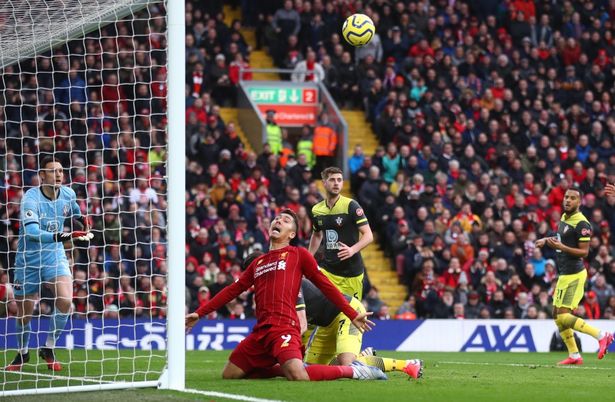
By Paul Tomkins
These Numbers Stink!
For a few years now I’ve been asking where Liverpool’s missing penalties are. The trend continued in 2019/20, although the Reds still managed to rack up the second highest points tally in English football history, to go with what is now the fourth-highest from the year before (with a Champions League success thrown in).
Tomorrow, after I thought it worth looking into once again, Andrew Beasley will go through all the penalty shouts Liverpool had last season, complete with video examples and data. (Both pieces will be free to read, and appear as part of our Free Fortnight series, which will become a quarterly feature. Click on the link for an updated list of the articles that are not paywalled.)
Before then, I thought I’d look once again at the more general trends, which date back to 2014 in some cases, and in others, way back to 2002. (Some of this is discussed in my new book, Perched: Jürgen Klopp’s Liverpool FC – Champions Of Everything, but there was so much other stuff to go through it was mostly reduced to a passing mention.)
Now, moaning about not getting penalties when you haven’t won the league always seems like sour grapes; but with Liverpool champions despite little help from the referees, now is precisely the time to drive this point home once again. Liverpool won the league with a tiny number of penalties for a top team, and were also only on +2 for VAR overturns (while Brighton ended with +8 and Manchester United with +7, along with literally nearly three times as many penalties as Liverpool: 5 vs 14). Yet even now we hear that the officials “handed the Reds the title”.
A penalty is essentially “three-quarters of a goal”; 0.76xG – or a 76% chance of scoring. And while that’s the average, it’s an even better chance if you have a particularly good penalty taker. (Although weirdly, Lionel Messi is merely an average penalty taker: he’s taken almost 100, and scored 76% of them. He’s no James Milner, is he?)
To me, even though I know only too well that a “good chance” in a match may only have 0.4xG, depending on various factors, I also assumed that in 38 games a good side might get 20-30 chances that rate higher than 0.76. After all, there are tap-ins and close-range shots, free headers from six yards, and so on. I mean, just look at Raheem Sterling against Lyon, the goal gaping, six yards out – no keeper to beat, and twice as close to goal.
Now, one thing I often note is how the moving ball, particularly coming across at speed from the flank, is deceptively hard to score from; whereas a stationary ball, under control, is easier to connect with (unless you are Ronnie Rosenthal). I mean, something like golf is hard enough, but imagine trying to hit shots where the ball is being rolled to you at 40mph. Penalties take away all the other variables, with the ball on the spot.
Now, even a virtually open goal from four yards won’t be 1.0xG, because other shots from that same position would have failed, either as they were difficult headers or bouncing balls; or the keeper and two defenders were on the line. That may be why Infogol gave the Sterling chance 0.59, so not as good a chance as a penalty (presumably as their model doesn’t take into account the fact that the goalkeeper was not in place to stop the shot – most times, the keeper would be in the way.) Complex models take the goalkeeper’s position into account, and Statsbomb rated it at 0.87. This was, indeed, a better chance than a penalty. But still one that is missed more than once in every ten attempts.
But even with all that said, Liverpool created just four Premier League chances that, in xG terms according to the less-perfect Infogol model, ranked as a better probability of being scored than a penalty (and all four were scored). Surprisingly, Manchester City – who seem to be the masters of creating such “walk the ball into the net” chances – created a measly two, and only one was scored; while Manchester United created three such chances, and again, only one was scored.
So, add all these together, and you can see that three of the best attacking sides in the country – certainly the two best, plus United – have, in total, created just nine “better than a penalty” chances, even if the definitions of “better than a penalty” can be quibbled over. By contrast, Manchester United won 14 penalties, to City’s 11, and to Liverpool’s bizarrely low five.
Now, of course a lot of goals are scored from much lower value shots: maybe a one-in-five chance, and occasionally a 1% chance, like Fabinho’s Exocet against Crystal Palace.
But statistically, a penalty really is a massive deal. If scoring one goal in a game increases your likelihood of getting points (one goal scored means that a team averages at least one point, two goals scored equals at least an average of two points, and three goals scored equals an average of 2.5 points, with 5+ being the only virtual guarantee of all three points, with a 5-5 draw occurring once in a blue moon), then having a 76% of scoring a “free” shot 14 times in a season could be worth a lot of points.
Now, I read a newspaper assessment of United’s 13 penalties (before they won a 14th) that reckoned nine were legit, two were borderline and two were travesties. Which, seems pretty fair, if true. It sounds like United deserved most of their penalties, and all clubs will get penalties they deserve, and the occasional soft or positively gloopy award.
Ole Gunnar Solskjær said in July that: “If you’ve got quick feet like Dan James, Anthony Martial, Marcus Rashford, Mason Greenwood, you’ll get tackled outside and inside the box.”
True. But what about even better quick players, like Sadio Mané and Mo Salah? Who has quicker feet in the Premier League than Roberto Firmino?
Salah is an interesting one, as he is rarely tripped, but often grappled with. Now, if contact shoulder to shoulder, or a two players tussling equally where their hips brush each other, or their arms are at their sides (or maybe slightly across one another) as they fight for the ball, you don’t expect a penalty. There will be contact. A defender can get tight to a striker. Joe Gomez did this to Raheem Sterling at the Etihad, and it was a foul, although Sterling obviously needed to “dive” and arch his back to draw the referee’s attention (although no one pointed this out in the way they would have said of Salah “he’s gone down easily there”). What Gomez didn’t do was bring Sterling down or take him out; but it was still a fair decision, even if one that isn’t always given, especially if the forward stays on his feet.
But in all the years I played the game I never knew that it was acceptable for a defender to use his hands higher up on a striker to impede that player; because it wasn’t. Yet the only time Salah got a penalty for being grabbed in 2019/20 was when David Luiz had a huge clump of his shirt.
If you grab a striker’s shoulder as he goes past you, you illegally slow him down. You often don’t bring him down. But most strikers will stop, or fall over, to prove their point (see Sterling vs Gomez). If you illegally slow someone from running at 20mph to even 19mph by grabbing them round the neck or shoulders, that may be enough for the keeper to come and claim the ball, or for that defender to get a toe to poke it behind. It’s illegal. The same applies to defenders wrestling someone like Virgil van Dijk over at corners with literal rugby tackles (see tomorrow for examples).
Of the four Premier League players to have the most touches in the opposition box in 2019/20 (as of matchweek 34), three were Liverpool players: Mo Salah ranked 1st (Sterling was 2nd), then Firmino 3rd and Mané 4th. Manchester United didn’t have anyone in the top 10. Indeed, Salah was top of all the major five European leagues for most touches in the box (Firmino ranked 7th across those leagues, Mané 11th).
Liverpool had 293 touches in the box per penalty, Man United just 81, according to Anfield Index Pro‘s Simon Brundish. United win penalties at four times the average in the league overall, yet they only carried the ball into the box just 10% more than league average.
So why are clubs like Liverpool getting only roughly a third as many penalties as United, and why do United also get more penalties than Manchester City?
It’s just one season, and randomness always plays a part in penalties, but I’ve been asking for at least two years where all Liverpool’s missing penalties are. There’s a gaping hole in the data where logically there should almost twice as many. Other clubs are getting their quota, but Liverpool are not.
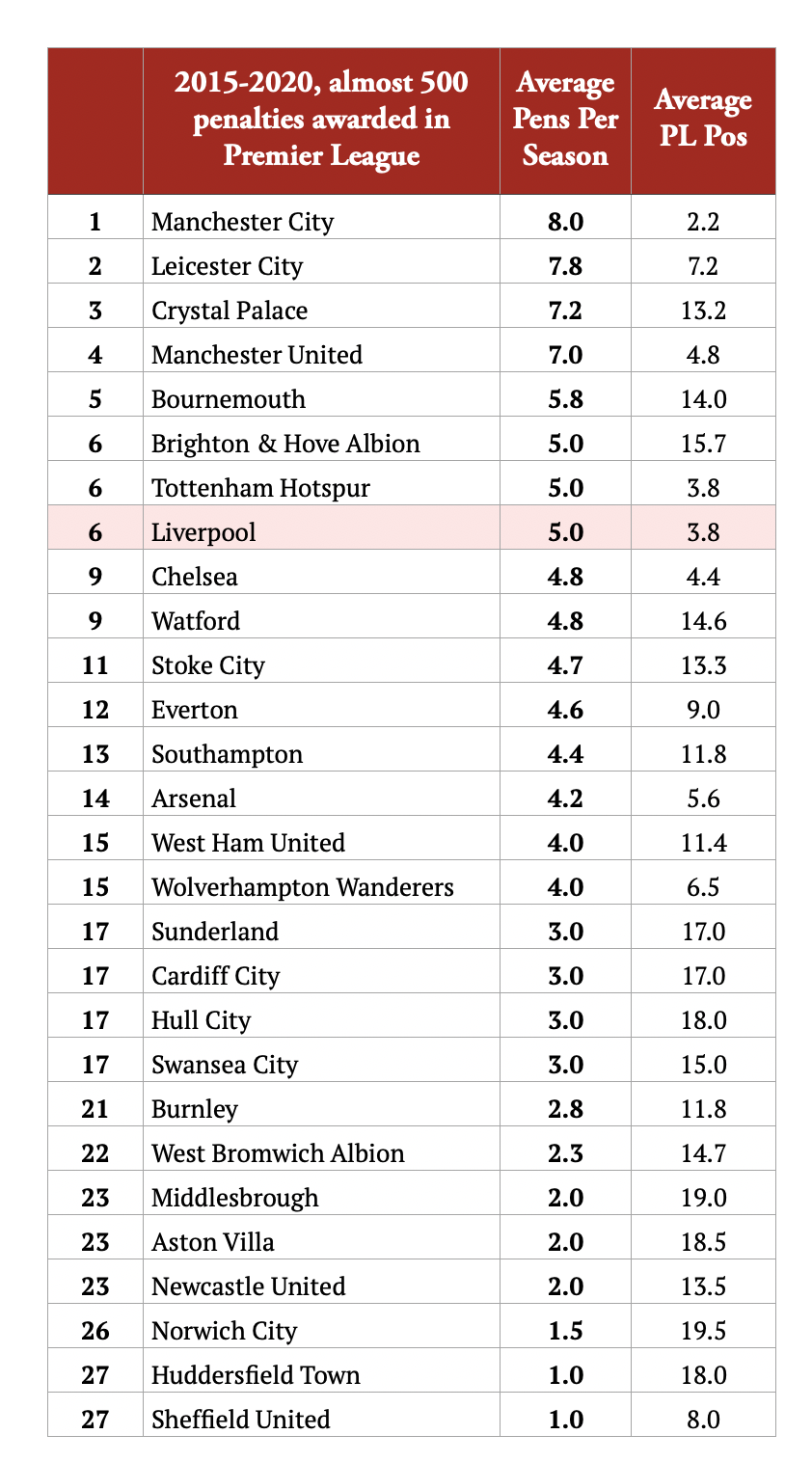
Now, how close to a scoring chance were any of these situations that resulted in the 14 penalties for United? Because the penalty for a keeper taking out a striker about to score results in the same 0.76 xG from the spot as someone pushed over from a corner when the ball is heading away from goal near the edge of the box. Now, obviously Liverpool benefited in the Champions League final from a handball from a situation that was not about to clearly lead to a goal; but Moussa Sissoko stuck out his arm, high and wide of his body, to block the ball. Liverpool were lucky in that he was stupid enough to do that, but it was about as blatant a handball as you will ever see.
So if a team like United struggles to create utterly superb chances (because all clubs struggle to create ones that are absolutely on a plate), and then gets 14 free shots at goal, it seems a massive deal; especially when Liverpool create four utterly superb chances all season, and then win only a further five penalties. That’s a total of nine utterly superb chances in the Premier League this season, to Manchester United’s 17; and the referee accounts for three-quarters of United’s, and only half of Liverpool’s.
Now, it didn’t cost Liverpool this season. Often the lack of a penalty decision on clear fouls in the box was overcome by the Reds winning the game anyway; but of course, it made games harder, and needed more effort in the final stages. It allowed the narrative to build that Liverpool were lucky because they sometimes relied on late winners, when they should have had penalties earlier in those games (and tomorrow you can see for yourselves how many extra, but even when trying to be as neutral as possible, as Andrew is when he assesses them, we’re still getting close to double-figures for clear penalties that were not given. Other clubs will obviously also have such claims, but it seems more marked with Liverpool because since 2014 they are getting so few penalties overall, and a ludicrously low amount at Anfield).
Indeed, my main issue is more at Anfield, where Liverpool simply do not get a logical amount of penalties. Everyone thinks they get too many; but the counterintuitive truth is that they get too few.
Also, an opposition player hasn’t been sent off against Liverpool at Anfield since September 2016 (Hull City), and for those who think Liverpool get all the decisions home and away, the red card totals for opponents during Klopp’s tenure – despite the Reds often winning the league’s fair-play award – number just four (including the one against Hull) in almost five seasons, while in the same time (since October 2015) the Reds have had James Milner, Brad Smith, Sadio Mané, Jordan Henderson, Milner again and Alisson dismissed.
While it’s hard to argue with most of those decisions, it still doesn’t explain why Liverpool get more players sent off at Anfield than the entire combination of visiting teams added together, given that Liverpool are almost always bossing the game and the ball, during a period of one of the most dominant home records in English football history. Not all games at Anfield will see opponents get away with what should be red card offences – lots of games have no penalty shouts and no red card offences – but that doesn’t mean there have been none in that entire period. Far from it.
In almost 50 halves of football – during which time the Reds were unbeatable at home – Klopp’s men won fewer Kop-end Premier League penalties than Spurs managed in just two visits. (Liverpool would later get a second Kop-end penalty when Spurs’ Serge Aurier – somewhat ironically – clattered Mané, in October 2019, to allow the Reds to merely equal Spurs’ record at Anfield; over 50 halves of football for Liverpool, versus three for Spurs.)
Quality or Britishness?
Last year, looking at the data from 2015-2019, the trend was that, on average, teams that finish outside of the top six but above the relegation zone tended to win the most penalties.
So one theory was that teams going for the title don’t get penalties in the social media age as it’s too risky for referees (given the insane scrutiny they are under, from dickheads on the internet, including me), although this didn’t apply to Leicester City, and Manchester City have also had a lot of penalties in some of their title wins.
But this year, Manchester United’s rise to 3rd in the table with the most-ever penalties in a season meant that the swing is back to the top six winning the most penalties (indeed, the club that finished 3rd is now skewed to the top, due to United; as such, it highlights the issue of smaller sample sizes and how one big outlier can alter the outcome).
My other explanation for the mid-table teams winning more penalties was that teams like Leicester and Crystal Palace had the most prolific penalty-winners, and they just happened to be either British or British-raised.
More specifically, they are English/English-raised. (By English-raised, I mean that they at least moved to the country as children, and in the case of someone like Wilfried Zaha, even played for England before switching.)
Race was not looked at as an issue (not least as, in addition to it being a thorny issue, it’s hard to decide who is a certain race, especially if of mixed ancestry), though it may play a part; but it seems that the English players of colour are treated better than African players of colour, for example. “Foreigness” may be the factor at play. And anyone of my age who grew up watching football commentary will know that that “diving foreigner” was about as common a stereotype as you could ever wish to see.
Also last summer, with the help of some subscribers to this site, I undertook a study of all c.600 Premier League penalties between 2012 and 2019.
Each penalty was listed, along with a description from the media (usually the BBC or Sky Sports). We listed the nationality of the player adjudged to have been fouled and the playing adjudged to have fouled him (there were also some handball penalties, but these were rare). We made no judgement on the validity of each penalty – just looked at the numbers.
And it suggested that Brits won penalties more frequently than non-Brits (at a rate that was greater than the minutes British players played), and that foreign defenders were much more likely to concede penalties. In both instances, the majority of the best attackers and defenders in the Premier League clearly skew foreign (they comprise the vast majority of the elite talent in England, with a few top-class Brits thrown in); but the decisions were much more likely to favour homegrown players based on minutes played. List all the best foreign attackers and defenders and the came off worse in penalties decisions than the smaller sample of elite British forwards and defenders.
Seven of Manchester United’s 12 non-handball penalties in 2019/20 were won by British players. Marcus Rashford won twice as many as any other United player with four, while Daniel James, Brandon Williams and Scott McTominay (yes, those two world-class attackers) won penalties. When Liverpool had their only mad penalty-winning season in recent times, with 12 under a British manager in 2013/14 when coming within two points of the title, the split (excluding two handballs) was 7-3 in the Brits’ favour. We think of Suarez winning them, but Raheem Sterling won three (the same as Suarez), and Daniel Sturridge won two, along with one each for Joe Allen and Jon Flanagan (just to show how weird this stuff gets, Flanagan won more penalties, per 90 minutes for the Reds, than Roberto Firmino). Liverpool won nine of those 12 away from home.
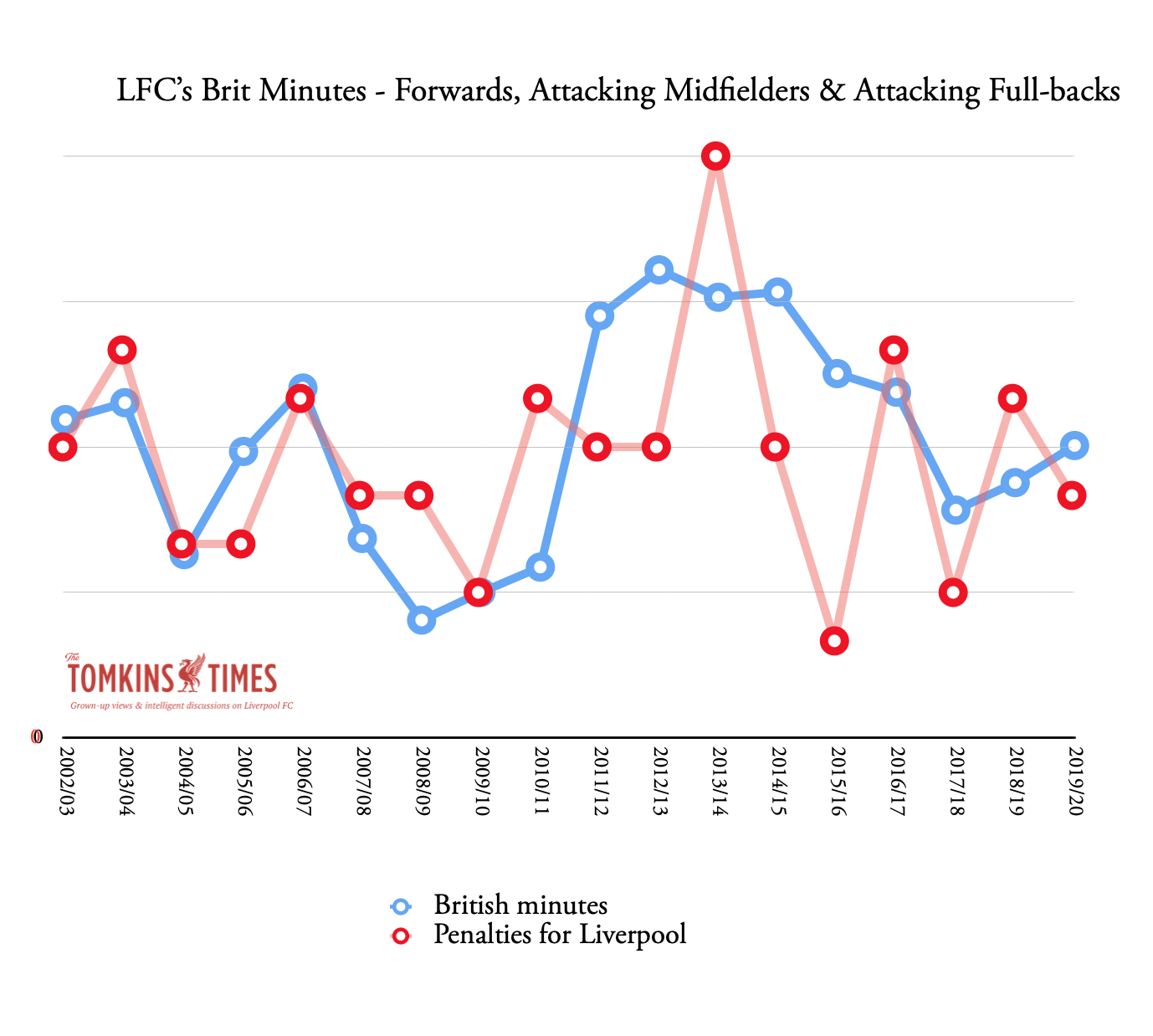
We know that referees are biased towards home teams; this is proven in various studies. This alone proves that referees do not make cold-blooded decisions but are often highly influenced with the situation.
Their other biases seem less understood. (Including why I believe “the myth of the Kop” makes them less likely to give Liverpool big decisions at the Kop end.)
As seen above (and correlation does not automatically equal causation), Liverpool win penalties almost in perfect correlation with the number of minutes played by attacking British players (full-backs, forwards, wingers and attacking midfielders). When the number of British minutes go up, so does the number of penalties won.
In an era when Liverpool have pretty much only foreign attacking players (the four main strikers, plus new addition Takumi Minamino are all foreign), the theory would suggest the Reds will win fewer penalties. Lo and behold, they do.
Homers!
And of course, when that referees are biased towards home teams, this applies to every team … except Liverpool!
Since the start of 2013/14, Liverpool are the only big club to win less than half of their penalties at home. Due to the number won in 2013/14, the Reds have a pretty healthy number of penalties overall, albeit 2013-2020 includes three title challenges, with one successful, and two decided for Manchester City on the final day.
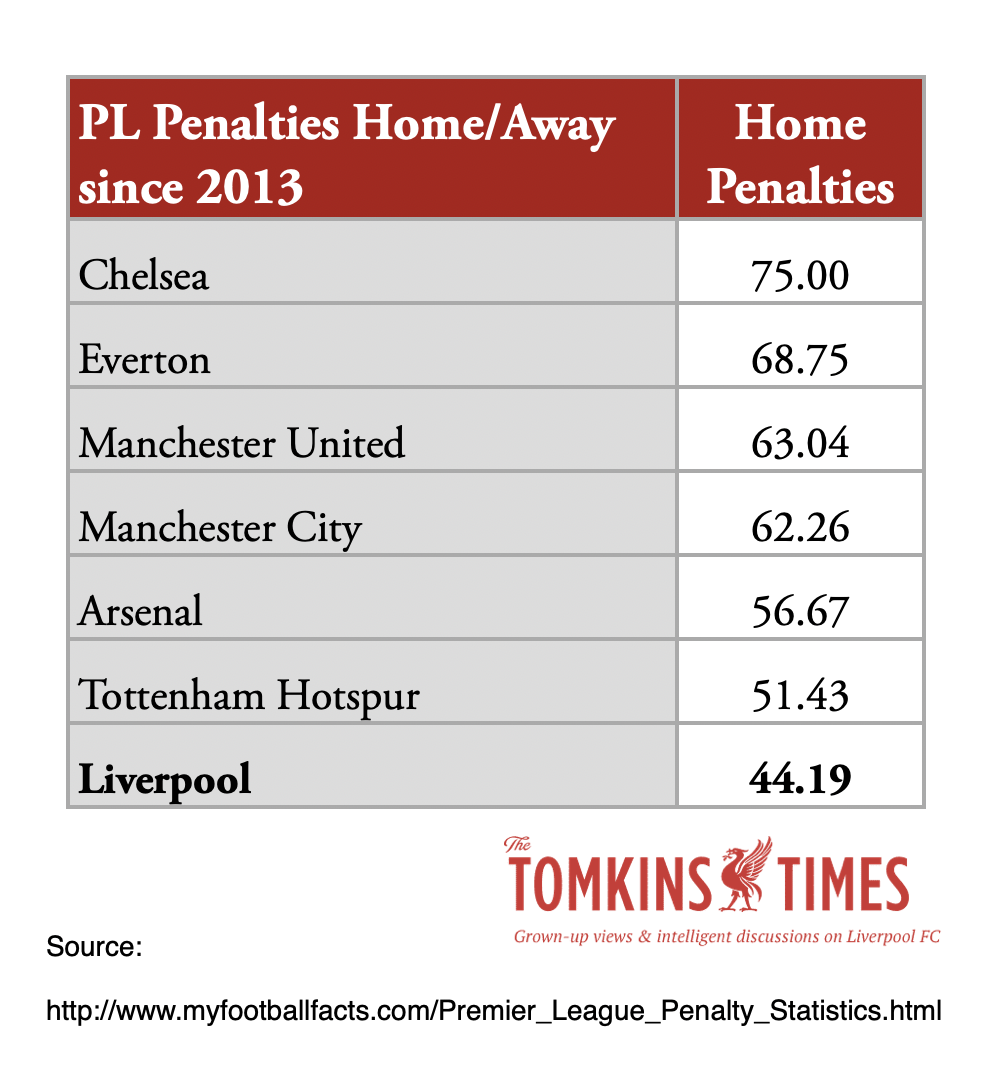
What Liverpool have not had is a healthy number of penalties overall, and especially at home, since Jürgen Klopp arrived. The penalties largely dried up when the English attackers left, and the British manager was replaced. The same thing happened when Rafa Benítez was boss.
In every single season, Benítez and Klopp (11 seasons combined) finished higher in the league table than in the penalty table. Never once did they have a season with a lot of penalties. In the five seasons managed by British bosses (Rodgers, Roy Hodgson and Kenny Dalglish), Liverpool finished 1-2 places higher in the penalty rankings than in the league table. This means the British bosses were aided and abetted by penalties in finishing lower than the foreign bosses who were kneecapped by penalty decisions.
Again, this could just be coincidental, but it generally tallies with the minutes played by British players, with British managers obviously favouring them more than either of the two foreign bosses (who still play/ed British players, just not as many), who were, on average, more successful managers.
During his time, Klopp’s Liverpool rank 6th in the league for penalties won, level with Spurs and Brighton, and behind Leicester City, Crystal Palace and Bournemouth, as well as both Manchester clubs. (Again, the fact that three Premier League referees are from Manchester, and get to regularly officiate Manchester teams, may be purely coincidental.) Liverpool won slightly more penalties per season than Chelsea and Arsenal in that time, but both those clubs have had very inconsistent teams.
(That said, Eden Hazard won very few penalties; had he been English he may have won three times as many. He remains, of course, a dirty cheating foreign diver, etc.)
Miscellaneous
Since Klopp took charge in 2015, Liverpool have had fewer Premier League penalties at Anfield (12) than Man United have had home and away last season (14).
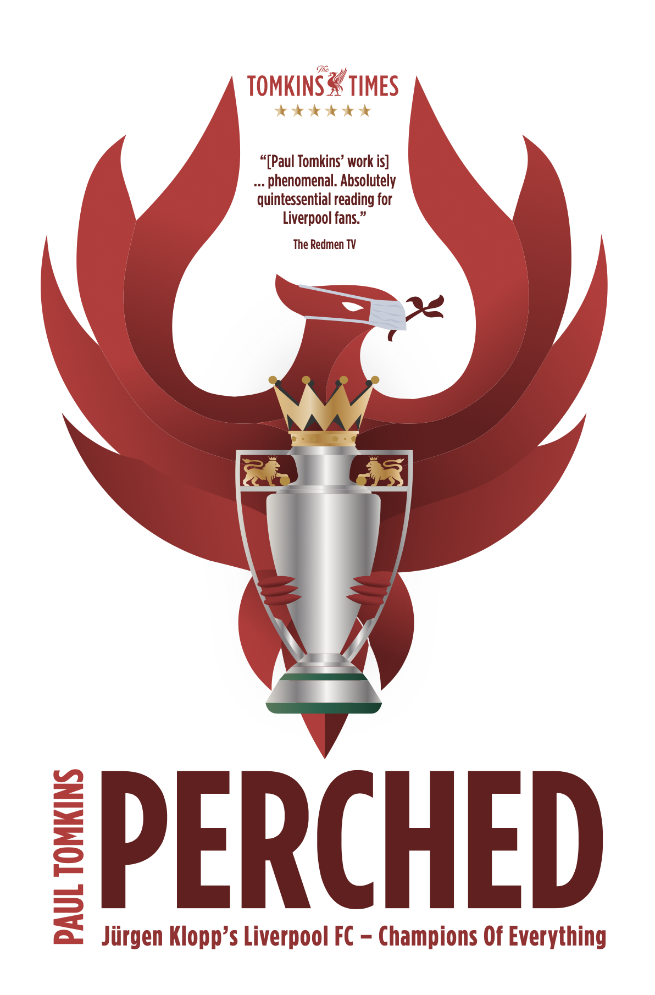 In less than two seasons, Man United have had 13 Old Trafford penalties. Again, Liverpool have had 12 at Anfield in Klopp’s entire reign, dating back to 2015 – despite having the best home record in English football history during that period of time (including a run of 24 straight wins, and no defeats since April 2017).
In less than two seasons, Man United have had 13 Old Trafford penalties. Again, Liverpool have had 12 at Anfield in Klopp’s entire reign, dating back to 2015 – despite having the best home record in English football history during that period of time (including a run of 24 straight wins, and no defeats since April 2017).
Since the 8th May 2017, Liverpool have had two Kop-end penalties in the Premier League (same amount as Spurs).
Martin Atkinson gives Liverpool so few penalties per game that, in recent years, the Reds would get fewer penalties than relegated clubs if Atkinson did all 38 Liverpool games. He was also at the heart of many of the VAR calls that went against the Reds in 2019/20. Has he finally retired?!
Paul Tomkins’ new book “Perched: Jürgen Klopp’s Liverpool FC – Champions Of Everything” is available NOW!
The paperback should be available in all major Amazon stores (UK, USA and a few others that provide the service), and the Kindle version on any store that sells Kindle ebooks. If you can’t get the paperback on your local Amazon store then use the UK or US ones: